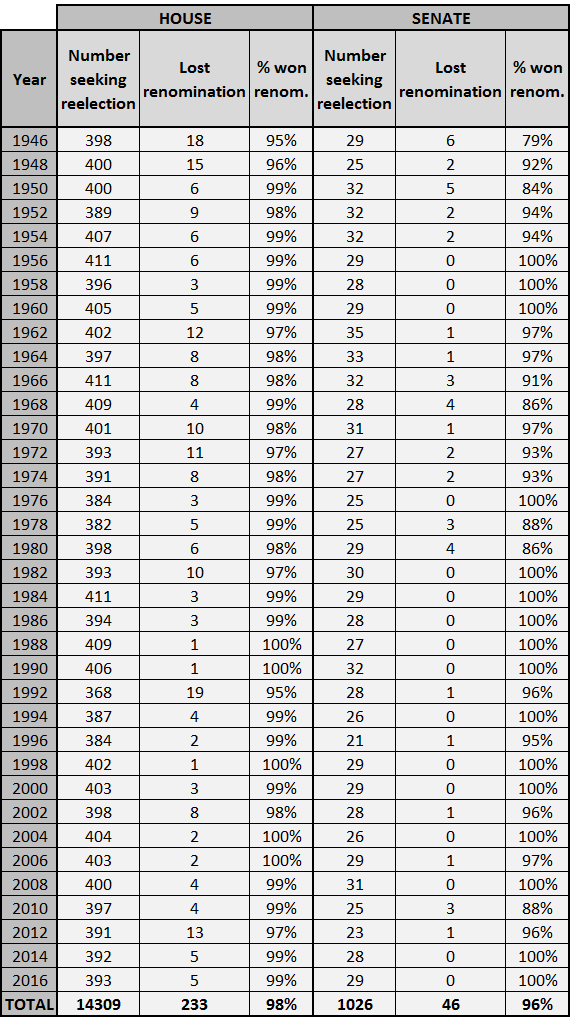Primary Colors in Red
A Commentary By Kyle Kondik
What are the prospects of a GOP purge? And could the president face his own troubles?
A Trump-Bannon move against Republican incumbents would not be unprecedented, but having widespread success would be…
If President Trump actively campaigned against incumbents of his own party in primaries next year, it would be an unusual political occurrence. But it would not be without precedent. In fact, he wouldn’t even be the first ideologically flexible, wealthy New Yorker who occupied the Oval Office to do so.
President Franklin Delano Roosevelt tried to knock off several fellow Democrats in 1938 primaries. Back then, neither party was ideologically cohesive and a lot of key Democrats were conservatives (many were from the South, but there were several others from outside of the South, too). Roosevelt, along with many others (including prominent political scientists), wanted the parties to be sorted ideologically, with the Democrats as the clearly liberal party and the Republicans as the clearly conservative one. Over the course of several decades, they got their wish in the current iteration of our two-party system, although it’s debatable as to whether the nation is necessarily better off for it.
In any event, the FDR purge proved to be largely unsuccessful. Only one of the conservative Democrats who FDR disliked, Rep. John O’Connor of New York, ended up losing, and FDR did not really personally target him. Many others, such as Sens. Walter George of Georgia, Millard Tydings of Maryland, and Ellison “Cotton Ed” Smith of South Carolina, ended up retaining their seats. We were going to go in-depth on the 1938 purge this week, but Bill Scher of Politico Magazine and Peter Baker of the New York Times beat us to it, and we recommend both of their excellent pieces tying the FDR purge to the modern day. Additionally, historian Susan Dunn gives a definitive account in her 2010 book, Roosevelt’s Purge.
Two overarching lessons from FDR’s attempted purge are that even a president with excellent approval in his own party is not all-powerful within that party and, more broadly, incumbents are often really hard to defeat in primaries. Democratic incumbent challenges were not very successful in 1938, and they wouldn’t become more successful in future elections. Table 1 below presents incumbent renomination rates in federal election cycles during the post-World War II era.
Table 1: House and Senate incumbent renomination rate, 1946-2016
Sources: Vital Statistics on Congress, Crystal Ball research
As is clear, those who want to be renominated almost always win renomination, and despite the oft-cited primary unrest on the GOP side, that has not really translated into more incumbents losing. Yes, there have been some very high-profile primary losers, like former House Majority Leader Eric Cantor (R, VA-7) in 2014, but those are exceptions to the usual reality. All told, 98% of House members and 96% of Senate members who have sought renomination in the postwar era have advanced to the general election.
It remains unclear how far President Trump will pursue challenges. As is often the case with this president, he is hard to pin down, on both this topic and others.
One can argue that Trump already has claimed a scalp, now that Sen. Jeff Flake (R-AZ) has announced his retirement. Flake, a vocal Trump critic, badly lagged in polls for renomination, and even if he made it through the primary, he would’ve likely had a difficult general election path against, most likely, Rep. Kyrsten Sinema (D, AZ-9). A couple of months ago, Trump seemed to endorse Flake’s Republican primary challenger, former state Sen. Kelli Ward, although now that Flake has retired, bigger names seem likely to enter the race, and Trump’s backing will be up for grabs as he seemed to back away from his support of Ward almost immediately after tweeting it.
We moved the Arizona Senate race to Toss-up two months ago, and we’re keeping it there. Trump has also sent mixed signals about Sen. Dean Heller (R-NV), who is being challenged by perennial candidate Danny Tarkanian (R). Could the president intervene there, one way or the other?
Or might he shy away from backing primary challengers?
Trump recently appeared with Senate Majority Leader Mitch McConnell (R-KY) and said he might try to get Steve Bannon, a Trump consigliere and lightning rod former White House official who is now back at Breitbart News, to back off finding challengers for some incumbent Republicans. As part of that, Trump has reportedly assured three other Republican Senate incumbents running for reelection next year — Sens. Roger Wicker of Mississippi, Deb Fischer of Nebraska, and John Barrasso of Wyoming — that he will support them, even as Bannon and his acolytes may support primary challenges against one or more of these incumbents. Trump also may feel burned because he stuck his neck out and endorsed appointed Sen. Luther Strange (R-AL) in his primary, but former state Chief Justice Roy Moore (R) still ended up winning a runoff. The Strange-Moore battle pitted Trump against Bannon, who backed Moore in the race, but it’s hard to give Bannon much if any credit for Moore’s win.
Despite a history of incumbents almost always winning renomination, there is always a chance that we could see more incumbent losses than we’re used to on the GOP side. Clearly, the nomination of Trump, against the wishes of party leaders, is a sign that Republican primary voters are open to going their own way. And even though there have been few GOP primary losers in recent cycles, that topline success obscures some relatively weak performances. In 2014, six reelected Republican senators won 60% or less in their primaries — Pat Roberts of Kansas, Mitch McConnell of Kentucky, Thad Cochran of Mississippi, Lindsey Graham of South Carolina, Lamar Alexander of Tennessee, and John Cornyn of Texas — and Roberts and Alexander actually won less than 50%. Cochran won a very narrow majority in a runoff after he finished slightly behind state Sen. Chris McDaniel (R) in the initial primary (McDaniel is considering challenging Wicker next year). Last year, Sen. John McCain (R-AZ) barely won a majority against a field of challengers led by Ward.
Flake was in deep trouble and now he’s heading for the exits. Tarkanian could threaten Heller. Other GOP senators could also face challengers, although it’s unclear how threatening those challenges will be. It also seems likely that the nominees who replace Flake and retiring Sen. Bob Corker (R-TN — more on him below) on the GOP slate in their respective states will be closer to Trump than the departing incumbents. Trump may already be having more success in reshaping the Republican Party in his image in the 2018 cycle than FDR did in the 1938 cycle.
While there are not widespread challenges to Republican House members, there are a few who are already facing opposition, such as Reps. Martha Roby (R, AL-2), who saw a precipitous drop in her general election support after she un-endorsed Trump last fall in the wake of the Access Hollywood tape; Mo Brooks (R, AL-5), who finished third in the special Alabama Senate primary to Moore and Strange and backed Moore in the runoff; Dana Rohrabacher (R, CA-48), who is under fire for his cozy relationship with Russia and where an all-GOP general election with businessman Stelian Onufrei could play out in a general election if too many Democrats split up the remaining votes in California’s top-two primary and both Republicans advance; Doug Lamborn (R, CO-5), a sometimes-weak primary performer whose opponents include Darryl Glenn, Colorado’s GOP Senate nominee last year; Robert Pittenger (R, NC-9), who barely won a three-way race after redistricting changed his district last year and will again face 2016 runner-up Mark Harris, a pastor who may win Bannon’s support; and Mark Amodei (R, NV-2), who is facing failed 2010 Senate nominee Sharron Angle. While there really is not a unified theme driving these primary challengers, it’s possible that Trump could try to intervene in one or more of these races.
The potential for Trump picking and choosing his primary interventions also is reminiscent of FDR, who alternated between actually endorsing Democratic challengers against conservatives to ignoring incumbents he didn’t like.
Ultimately, let’s just be clear here: Trying to predict what Trump will do in primaries next year is a fool’s errand. We just don’t know, and he may not either. All we can say is that a president pursuing a widespread course of reprisal against members of his own party is a rarity. FDR’s 1938 attempted purge is the only example we can think of. FDR did not have much success, but it may be that the modern GOP electorate is a little more open to primarying challengers than the Democratic electorate was then. Still, there’s not much precedent for more than a handful of members of Congress losing renomination in any given year. But those historical averages don’t take into account incumbents who might’ve seen the writing on the wall and headed for the exits, like Flake.
…and a primary challenge against the president himself a couple of years from now might have similarly low prospects for success
Trump reportedly told Sen. Bob Corker (R-TN) that he would campaign on Corker’s behalf in a reelection bid, but the two-term senator decided against running for a third term next year. Unlike Flake, Corker probably would’ve been OK in both a primary and a general election, but we also just cannot assume with perfect certainty that he wouldn’t have succumbed to a challenger.
Now, Trump and Corker are sniping at each other as Corker, freed from reelection concerns, is voicing strong criticisms of Trump that his colleagues may be fearful of expressing. Corker said Tuesday morning that Trump will be remembered for the “debasement of our nation,” and Trump tweeted that Corker “couldn’t get elected dog catcher in Tennessee.”
Many, including us, have become numb to the constant sniping between Trump and various members of his own party, but in any other presidency, such open warfare between a president and a prominent senator would be a really big deal. And given the widespread antipathy many elected Republicans feel toward the president, albeit expressed more often privately instead of publicly, one has to at least wonder: Could Trump have primary trouble of his own if he seeks a second term, as one would assume he will at this early point?
The short answer is that there’s not much reason to think Trump would, although even a seemingly minor challenge could be an indicator of bigger problems.
There’s one obvious difference between this list of postwar presidents — Barack Obama, George W. Bush, Bill Clinton, Ronald Reagan, Richard Nixon, and Dwight Eisenhower — and this list — George H.W. Bush, Jimmy Carter, Gerald Ford, and Lyndon Johnson. The presidents in the first group all won two terms in the White House, while the others did not. The elder Bush and Carter were defeated in their bids for a second term, Ford never won election at all after taking over for Nixon, and Johnson retired.
But there’s something else that separates the first and second groups — the members of the latter group all had notable primary challengers that inflicted political damage on them, and the members of the first did not. It’s a history worth remembering as one begins to ponder 2020.
Johnson turned in an underwhelming performance in the 1968 New Hampshire primary by beating Sen. Eugene McCarthy (D-MN) just 50%-42%, a result that along with a number of other factors including Vietnam compelled LBJ to pass on running for a second full term. Ford and Carter each had to fight off strong challenges from then-former Gov. Ronald Reagan (R-CA) and Sen. Ted Kennedy (D-MA), respectively, and both of those races didn’t end until the convention. And while Bush-41 did not face as serious of a challenge, conservative pitchfork populist Pat Buchanan took 38% of the vote against him in New Hampshire.
Given the frequent uneasiness many top Republicans have expressed about aspects of Trump’s presidency, it seems possible that he may not get a free pass in the 2020 GOP presidential primary. Nonetheless, if Trump were challenged, and even if his overall approval numbers were as weak or weaker than they are now, he would still have to be seen as a big favorite in a primary. Trump would be running as the sitting president, and even with sub-40% approval ratings, Trump still retains support from about 80% of Republicans. That GOP approval would likely have to decline by a significant amount to open the door to a challenger, and it likely would have to be just a single challenger who could consolidate the anti-Trump vote, like a Reagan or a Kennedy in the Ford-Carter years.
Who would that figure be? None of the many 2016 GOP contenders came out of that primary with their reputations enhanced. It wouldn’t be surprising if term-limited Gov. John Kasich (R-OH) took another crack at the GOP nomination in 2020, but Kasich lost everywhere outside of Ohio, and he ran as the most centrist candidate last time, a hard place to be in a Republican primary. A more conservative candidate, perhaps someone like Sen. Ted Cruz (R-TX), might do better with very conservative voters than a Kasich would, but he might bleed support among the less conservative voters who would prefer someone like Kasich (or even Trump himself) to Cruz. In other words, it’s hard to find a figure in the party who could logically unite anti-Trump Republicans. And beyond that, there just aren’t enough anti-Trump Republicans to fuel a challenge, at least at the moment. Perhaps if a greater portion of the GOP electorate turns against Trump, someone like Corker or Flake could be attractive as an “I told you so” alternative. But we’re not even close to being at that point yet, and that point may very well never come.
Still, Trump may have to deal with his version of a McCarthy or a Buchanan — a gadfly who does well in an early state (like New Hampshire, which demographically is potentially friendly to a candidate like Kasich) and demonstrates at least some degree of soft support for Trump in the GOP electorate. That could be a precursor to bigger problems, if history is any indication.
That said, the main event in 2020 is still much likelier to be the Democratic primary, assuming Trump is running as the incumbent that year. If so, the out-party will be united in decrying the incumbent, but perhaps on little else as a big field of candidates could engage in a bitter, drawn-out primary.
Kyle Kondik is a Political Analyst at the Center for Politics at the University of Virginia.
See Other Political Commentary by Kyle Kondik.
See Other Political Commentary.
Rasmussen Reports is a media company specializing in the collection, publication and distribution of public opinion information.
We conduct public opinion polls on a variety of topics to inform our audience on events in the news and other topics of interest. To ensure editorial control and independence, we pay for the polls ourselves and generate revenue through the sale of subscriptions, sponsorships, and advertising. Nightly polling on politics, business and lifestyle topics provides the content to update the Rasmussen Reports web site many times each day. If it's in the news, it's in our polls. Additionally, the data drives a daily update newsletter and various media outlets across the country.
Some information, including the Rasmussen Reports daily Presidential Tracking Poll and commentaries are available for free to the general public. Subscriptions are available for $4.95 a month or 34.95 a year that provide subscribers with exclusive access to more than 20 stories per week on upcoming elections, consumer confidence, and issues that affect us all. For those who are really into the numbers, Platinum Members can review demographic crosstabs and a full history of our data.
To learn more about our methodology, click here.




